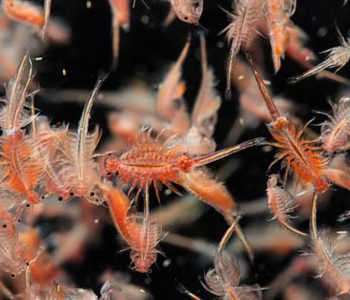Farming the Future of Feed: How Artemeal is Transforming Marine Protein for Poultry and Aquaculture
As global demand for animal protein continues to rise, so too does the pressure on the systems that support it—especially feed production. One of the most critical ingredients in animal feed, particularly for young livestock and fish, is fishmeal, a nutrient-dense marine protein. But fishmeal is also one of the most environmentally strained resources, and it is quickly becoming unsustainable.
Now, a new marine protein—artemeal, produced from farmed Artemia (a type of zooplankton)—is showing exciting promise. Led by Aquanzo and backed by a coalition of scientific institutions and industry stakeholders, this novel solution offers a way to maintain the nutritional value of fishmeal without the ecological costs of ocean harvesting.
This article explores the challenges of marine protein production, the innovation behind artemeal, and the potential impact of this breakthrough in both poultry and aquaculture feed systems.
The Fishmeal Dilemma: Nutritionally Rich, Environmentally Costly
For decades, fishmeal has been the gold standard in animal feed. Rich in essential amino acids, lipids, and micronutrients, it plays a vital role in supporting the growth and health of young animals and aquatic species. However, fishmeal production is based on the harvesting of wild fish, placing immense pressure on marine ecosystems that are already vulnerable due to climate change, overfishing, and habitat degradation.
Fishmeal currently represents up to 20% of total global fishery volumes, but production has remained relatively flat over the last 40 years, despite increasing demand. As a result, prices have soared and feed manufacturers are actively seeking alternatives—but no single plant- or insect-based protein has yet been able to match fishmeal’s unique nutritional profile.
A New Direction: Farming Marine Protein on Land
Aquanzo is pioneering a novel approach: farming marine zooplankton (Artemia) on land using agricultural byproducts as feedstock. This closed-loop, scalable production model transforms Artemia into artemeal, a high-quality marine protein ingredient suitable for poultry and aquaculture diets.
Instead of continuing to harvest marine life from increasingly fragile ecosystems, this system enables local, predictable, and sustainable protein production, aligning with both food security goals and climate mitigation strategies.
The project is supported by Innovate UK, the UK Agri-Tech Centre, and research partners such as Scotland’s Rural College (SRUC) and the University of Glasgow (CENSIS).
Early Success in Poultry: Outperforming Fishmeal
In a recent trial conducted with SRUC, artemeal was tested in broiler starter diets. The results were impressive: chicks fed artemeal outperformed those on fishmeal-based diets, both during early growth and by harvest weight.
“Birds fed artemeal during the first days of life outperformed those fed fishmeal, and this benefit carried through to being heavier at harvest,”
said researchers Dr. Jos Houdijk and Dr. Marwa Hussein at SRUC.
“These benefits also coincided with improved gut microbiome profiles and stronger immune organs, suggesting a robust and resilient poultry production pathway.”
These findings demonstrate that artemeal is more than just a substitute—it may actually be an upgrade in terms of animal health and growth efficiency.
Adding Value Beyond the Farm: Sustainability and Circularity
Artemeal production is not just about replicating the nutrient content of fishmeal—it’s about creating a sustainable protein platform. Aquanzo is currently working with CENSIS and other partners to develop a mobile farming system that uses nutrient-rich wastewater from industries such as:
- Distilleries
- Dairies
- Malting operations
This mobile, modular production model could allow for localised artemeal farms that not only reduce transport emissions but also valorize waste streams, contributing to a circular bioeconomy.
The system includes IoT-enabled monitoring and life cycle assessment tools to optimize production, track emissions, and ensure alignment with sustainability benchmarks.
A Stronger UK Feed Sector—and a Global Opportunity
With full-scale production, Aquanzo estimates artemeal could supply over 10% of the UK’s poultry starter feed needs within five years, feeding over 100 million chicks annually—all without a single fish being harvested from the ocean.
This shift could have wide-reaching implications:
- Feed manufacturers gain access to a consistent, customizable protein source
- Farmers benefit from improved growth and resilience in their flocks
- The environment is spared from further marine degradation
- Waste-heavy industries find new value streams
- Policymakers get a viable pathway to meeting sustainability goals
Collaborating for Change
Key to the success of this project is collaboration. Aquanzo has assembled a multidisciplinary team of 9 staff and 5 expert advisors covering areas such as:
- Marine biology
- Nutrition and feed science
- Engineering and IoT
- Circular economy and sustainability
- Commercialization strategy
Together, they are not just innovating in the lab—they are shaping the future of how we produce protein, turning an ecological challenge into a scalable solution.
The Road Ahead
Several trials are now underway or planned in both poultry and aquaculture systems, building a robust evidence base to support wider market adoption. The company is also developing databases and open-access reports on artemeal’s nutritional performance, sustainability metrics, and economic feasibility.
As the animal feed industry searches for diversified protein sources, artemeal joins the ranks of insect meal, single-cell proteins, and algae-based feeds. But its marine origin, scalability, and ecological compatibility may give it a uniquely strong case for long-term integration.
Final Thoughts: A Zero-Ocean Impact Vision
Aquanzo’s broader vision is clear: zero ocean impact marine protein. By farming instead of harvesting, and by using local byproducts instead of imported resources, artemeal represents a fundamental shift in how we think about marine ingredients—not as commodities to extract, but as bio-resources we can farm responsibly.
In a world of limited resources and growing protein demand, this shift isn’t just smart—it’s essential.
